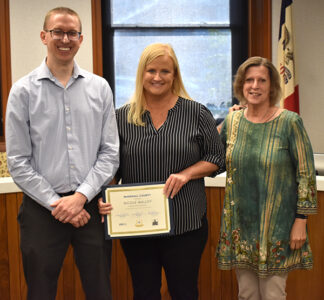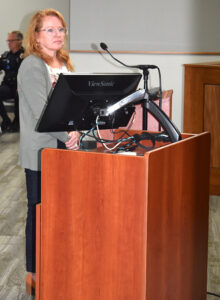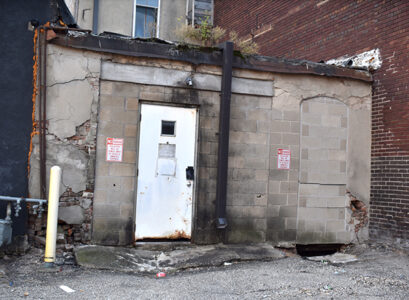MPACT will expand its reach throughout Marshall County with opioid settlement funds
Since its initial launch with funding from the city council at the beginning of 2021, the Marshalltown Police and Community Team — better known by the acronym MPACT — has enjoyed widespread approval and support among both law enforcement officers and the general public. Now, the co-responder program that embeds a pair of social workers within the MPD to handle non-criminal, non-emergent calls will be expanding its borders to include all of Marshall County thanks to money from the massive opioid settlement reached with governing bodies across the country.
During Wednesday morning’s Board of Supervisors meeting, Marshall County Attorney Jordan Gaffney shared some background on the new arrangement, noting that September is National Recovery Month and sharing some history of the MPACT program. As a result of the opioid settlement with the three largest distributors of the drugs, the county has received over $430,000 in total thus far and will continue to collect annual payouts for the next 14 to 16 years.
YSS of Marshall County’s David Hicks, who played a key role in launching MPACT with former Marshalltown Police Chief Mike Tupper, reached out to Gaffney about the possibility of expanding the services several years ago, and Gaffney thanked him for his “patience and perseverance” through the process. The agreement presented to the supervisors — a one-year deal in the amount of $125,031 — would officially make MPACT a countywide program and allow the sheriff’s office to have access to a social worker without using taxpayer dollars.
“If we move forward with the agreement, I think it would be wise to think about the longevity of the program and how long you would want it to run assuming it’s successful and YSS and the sheriff’s office would wish to continue,” Gaffney said.
To qualify for the settlement funding, a clear opioid abatement purpose must be demonstrated, and Gaffney said it would be geared toward prevention of abuse and remediation if an individual has an overdose or develops a substance abuse disorder. Board of Supervisors Chairwoman Carol Hibbs asked if the additional funding would allow for the hiring of another MPACT advocate — currently, Tiffany Beadle and Suzy Reed are the two on staff — and Gaffney confirmed that the organization would need to hire another person.
“That’s the biggest thing, having somebody who’s boots on the ground to make this happen, respond to calls and be available. Expansion is only able to happen if they have that additional person,” Gaffney said.
Hicks then came forward and gave some more background before noting that every year, the MPD is surveyed on the effectiveness of the MPACT program. The most consistent complaint is that there aren’t enough advocates to cover the amount of time needed.
“Right now, we’re covering, could be 2 (p.m.) til midnight. There’s days during the week where we do double shifts, but this would allow a third MPACT advocate to come onboard to cover maybe some more daytime shifts,” he said.
Hicks added that all calls within the county would receive the same level of priority regardless of where they are received, and, recalling the presentation Beadle and Reed shared with the city council on Monday night, said 100 percent of the calls MPACT has responded to have freed up officers to focus on criminal matters.
“We track that data. One of the things we wanted to concentrate on most was getting the officers back in the field to do what they do best,” Hicks said.
Supervisor Jarret Heil praised Hicks for his work on the initiative and liked the idea of a one-year test run to gauge the effectiveness of a countywide MPACT program. Hicks told him that other jurisdictions have utilized opioid settlement funds to launch co-responder programs, so he felt like Marshalltown and Marshall County had a head start.
Beyond just opioids, MPACT will continue to address issues like mental health, homelessness, domestic violence, juvenile issues and family conflicts.
“It’s a good use of these funds. Thank you for your patience,” Hibbs said.
A motion to approve the memorandum of understanding (MOU) on the YSS application for funds passed by a unanimous 3-0 vote. The board subsequently approved agreements with Purdue Pharma and the Sackler Family, which is estimated to amount to over $23 million across Iowa over a 16-year period, and secondary manufacturers of opioids, both by unanimous votes.
“This is good news and, really, I think, represents kind of a once in a generation opportunity to get these funds and put them to use here in Marshall County for folks who need help, and we just kind of set a plan in motion, with the MPACT program expansion, to do that, so I’m excited about that,” Gaffney said, comparing the settlement to the previous tobacco litigation from three decades ago. “It’s just a fantastic opportunity through what is truly a tragedy that has happened, so if we can turn something horrible into something good, I think we should do that.”
After the meeting, Marshall County Sheriff Joel Phillips shared his endorsement for the expanded program in an email to the T-R.
“With the success of MPACT in the city of Marshalltown, YSS Director David Hicks had requested funding for additional staffing to provide social service support beyond the city limits of Marshalltown. One of the hurdles is (the) geographical location of individuals that could benefit from MPACT services throughout Marshall County. The added mileage and travel time increased operating costs that the program just couldn’t absorb with expanded services. Opioid Settlement funds provide a unique opportunity to provide a service to Marshall County citizens without utilizing tax payer funds,” Phillips said. “This agreement is for 1 year that opioid funds will reimburse mileage (Federal mileage rate), fund a third MPACT position that guarantees 32 hours a week dedicated to citizens outside (the) Marshalltown city limits and expanded hours of service. I see this agreement utilized as enhancing our jail diversion program. Too often, incarcerated persons are released from custody and face homelessness, healthcare, mental health, substance abuse related issues, employment obstacles, and added community based correctional requirements that are an uphill battle for some. MPACT has the potential to bridge the gap of services needed for citizens that have completed incarceration to be successful and productive citizens.”
In other business, the board:
• Approved the consent agenda as listed.
• Recognized Nicole Malloy for 15 years of service to the Marshall County Attorney’s Office.
• Approved the purchase of a 2025 Chevy Silverado 2500 4WD crew cab LT from Karl Automotive Group in Des Moines for $55,706.80 by a 2-1 vote with Kevin Goodman opposed.
• Approved a contract between Marshall County and Garling Construction for the first phase of the Sheriff’s Office and Jail renovation project as outlined at the previous meeting.
Approved the compromi • sed agreement and authorized the Central Iowa Juvenile Detention Center (CIJDC) to execute and present a consent decree to the court.
Again heard from Mark Wyant during the public comment period about the conditions along his gravel road south of Marshalltown.
——
Contact Robert Maharry at 641-753-6611 ext. 255 or rmaharry@timesrepublican.com.
- T-R PHOTOS BY ROBERT MAHARRY —Marshall County Attorney Jordan Gaffney, left, and YSS of Marshall County Director David Hicks address the Board of Supervisors about the expansion of the Marshalltown Police and Community Team (MPACT) during Wednesday morning’s meeting. The county will utilize just over $125,000 in opioid settlement funds to hire an additional advocate and expand the program, which began in Marshalltown in 2021, to include all of Marshall County.
- Marshall County Attorney’s Office Administrative Assistant Nicole Malloy, center, was honored for 15 years of service during Wednesday morning’s supervisors meeting. Also pictured are Marshall County Attorney Jordan Gaffney, left, and Board of Supervisors Chairwoman Carol Hibbs, right.






